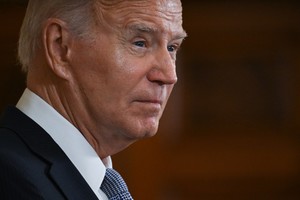When Biden’s Friends Become a Problem For Him

Like most presidents, Joe Biden has no shortage of enemies. On any given day, you can find a collection of MAGA Republicans, social conservatives, and anti-woke activists arrayed across the media landscape explaining why Biden should be a one-term president. That’s not so unusual; heading into an election year, the political landscape is predictable in its intensifying partisanship.
What’s more uncommon is a president embroiled in a closely-fought re-election campaign also being forced to dodge friendly fire from those he expects to have in his corner. But that’s exactly what’s happening to Biden, who, even as he looks at head-to-head polling showing him in a dead heat with Donald Trump, he’s facing a much less typical problem at the hands of his long-time partners in organized labor. The powerful United Auto Workers, the only major union not to endorse his 2024 candidacy to date, is now threatening to go on strike. A shutdown of that nature heading into an election year could be devastating to the Rust Belt economy – and just as damaging to Biden’s prospects in key swing states like Michigan and Pennsylvania.
The reason for this discord among such close friends is easy to explain – it’s due to the politics and economic realities of climate change policy. The UAW’s leadership has been unsparing in its criticism of Biden’s support for electric vehicles, which they see as a direct threat to their members’ livelihoods.
No American politician has been more steadfast in his support for unions and their members than Biden over the course of his career. So it’s entirely possible that many autoworkers were caught off guard when a number of Biden’s clean energy goals appeared to prioritize foreign investors over domestic interests. UAW President Shawn Fain has made it clear that dissatisfaction with the administration’s protections for domestic autoworkers during a shift toward electronic vehicle production was insufficient, and that his members’ failure to endorse Biden was a direct result of that unhappiness.
Now those same workers are on the verge of a strike against the Big Three automakers, and after Biden predicted on Labor Day that a work stoppage would be avoided, Fain lashed out in response. With a strike deadline looming later this week, the union head said that he saw little hope of resolution. Given the economic and political impact of a shutdown in key battleground states, this is the last thing a Biden re-election campaign already off to a wobbly start needs. But if the president assumes that his old friends are going to swoop in and save him, Fain’s combative language suggests that he may be disappointed.
The irony for Biden is that the green technology imperatives that created this rift between him and the labor movement had never been a priority for him prior to assuming the presidency. The strongest supporters of a more aggressive effort to combat climate change have put immense pressure on him to move on this front, but Biden appears to be receiving little credit from environmentalists, young voters, and others who prioritize climate-related issues. His poll numbers among these voting groups are middling at best, and their enthusiasm for his candidacy is tepid. By taking this path, the president may have cost himself the backing of some of his loyal supporters without achieving much political benefit in return.
Organized labor isn’t the only Democratic stalwart with the potential to cause Biden major headaches next year. New York City Mayor Eric Adams has been increasingly vocal in his denunciation of the president’s efforts to deal with the growing numbers of undocumented immigrants populating his city, and other Democratic mayors and governors are voicing similar complaints more quietly. Immigration policy may be Biden’s greatest vulnerability in a general election campaign next year, and grumbling from his own party’s elected leaders won’t help at all.
One of the president’s favorite sayings is to ask voters to “compare him to the alternative, not the almighty”, an approach that allowed him to frame a contrast with Trump that helped him to victory in 2020. Biden’s campaign team still believes that they can motivate Democratic voters—even those who oppose him on key issues—by reminding them how much they despise Trump. But these types of intramural policy and political battles may make that a more difficult sell than it was four years ago.
Want to talk about this topic more? Join Dan for his webinar "Politics In The Time of Coronavirus." Or read more of Dan’s writing at: www.danschnurpolitics.com.
Dan Schnur is a Professor at the University of California – Berkeley, Pepperdine University, and the University of Southern California, where he teaches courses in politics, communications and leadership. Dan is a No Party Preference voter, but previously worked on four presidential and three gubernatorial campaigns, serving as the national Director of Communications for the 2000 presidential campaign of U.S. Senator John McCain and the chief media spokesman for California Governor Pete Wilson. He has a Center bias.
This piece was reviewed and edited by Isaiah Anthony, Deputy Blog Editor (Center bias).
Photo credit: Chip Somodevilla | Getty Images

May 16th, 2024

May 16th, 2024

May 13th, 2024

May 9th, 2024